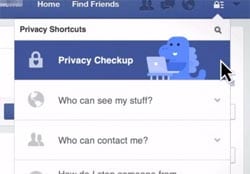5 ways your Facebook friends can put you at risk
The saying goes that a chain is only as strong as its weakest link. This can also be applied to our social media privacy and security.
While we may have locked down our accounts and always practise safe social media habits, it doesn’t mean our friends are doing the same. In fact if your friends follow poor social media habits, it can potentially put us at risk too.
We can’t control what our friends get up to, but we can be aware of the different ways they can put us as risk so we can make sure we don’t get fooled ourselves.
Here are 5 different ways your Facebook friends can put you at risk.
If they fall for fake Facebook competitions
There are plenty of fake Facebook competitions and promotions on the social networking website (more information on them here.) Those schemes that claim you just have to like and share a post as well as “Click This Link” to enter. These are usually spammy marketing schemes designed to harvest your personal information and them spam you.
A core tactic employed by such scams is to lure Facebook users into sharing the post with their friends. This means if your friends are falling for such scams, you’re going to have these spammy links showing up in your newsfeed.
This means you’re being exposed to scams. Yes, you still have to fall for one of them to get yourself into trouble, but the more scammy links a person sees on their Facebook newsfeed, the more likely they will fall for at least one of them.
If they have poor privacy settings
You can lock down your own digital presence as best as sites like Facebook will allow you, but the nature of social networking means that people can pry into your life via your friends.
And if your friends has poor privacy settings, this means it’s likely that strangers – even criminals – will have more information about you.
For example, friends that have their accounts wide open and post everything with public privacy settings applied. These people may post content involving you. This includes photos, check-ins and status updates. If one of those posts contains you, it is open to the entire Facebook community, regardless of your own privacy settings.
This means strangers could gather personal information about you, may be even see when you’re on holiday or otherwise away from your house. Certainly not things you want to be sharing with anybody.
Even a Facebook friend having their friends list set to public could be problematic for you, since that could lead to cloning scams. Learn more about Facebook cloning scams here.
Sponsored Content. Continued below...
If they get their account “hacked” – i.e. compromised.

The chances are that your privacy settings are (or at least should be) friends only. That’s great, but what happens if a security-naïve friend manages to get their Facebook account compromised leading to a criminal acquiring access to it?
Such a thing would allow a stranger to access your inner circle, and see what information you’ve posted, and any personal information about yourself you’ve shared on your account. It is for this reason why we recommend never sharing certain information about yourself on Facebook, even if you do have your settings to friends only.
Compromised accounts can also lead to scams involving a criminal masquerading as your friend to try and scam you. For example, the scammer could send you messages requesting money because of an “emergency”. Money which is then stolen by the scammer.
Another issue with compromised accounts is that the scammers can try and masquerade as someone else, for example the “Facebook Security Team“. They can change the name and profile picture of the account the compromised and sent you chat messages containing links to phishing scams. Learn more about these scams here.
If they install too many spammy apps
Facebook apps can be fun and entertaining. They can also by spammy, annoying and even dangerous. Did you know that unless you explicitly changed a Facebook App setting, Facebook Apps your friends install can access certain information about you?
This information is them available to the Facebook App developers who can potentially do whatever they want with it.
You can stop this from happening by either disabling the App platform entirely or going into your Settings / App Settings and selecting the option about what information third party apps can access about you.
Additionally, Facebook Apps can potentially post as the person who installed the app as if it were them, providing the friend gave it permission. Spammy apps are likely to post spammy, potentially dangerous links. And these links are going to show up on your newsfeed as if they were posted by your app-loving friend!
If they overshare
To combine all of these problems to one generic concern, friends who simply overshare too often and too much are always going to be a security and privacy risk to you.
Privacy is vital and it is important to remember that Facebook is still a part of the Internet. It may be a social networking website but there is still plenty of information that really has no place gracing cyberspace.
If you think your friend is sharing too much information relating to you, don’t be afraid to ask them to remove it! After all, it’s your privacy and security at stake as well as theirs.
Continued below...
Thanks for reading, we hope this article helped, but before you leave us for greener pastures, please help us out.
We're hoping to be totally ad-free by 2025 - after all, no one likes online adverts, and all they do is get in the way and slow everything down. But of course we still have fees and costs to pay, so please, please consider becoming a Facebook supporter! It costs only 0.99p (~$1.30) a month (you can stop at any time) and ensures we can still keep posting Cybersecurity themed content to help keep our communities safe and scam-free. You can subscribe here
Remember, we're active on social media - so follow us on Facebook, Bluesky, Instagram and X




